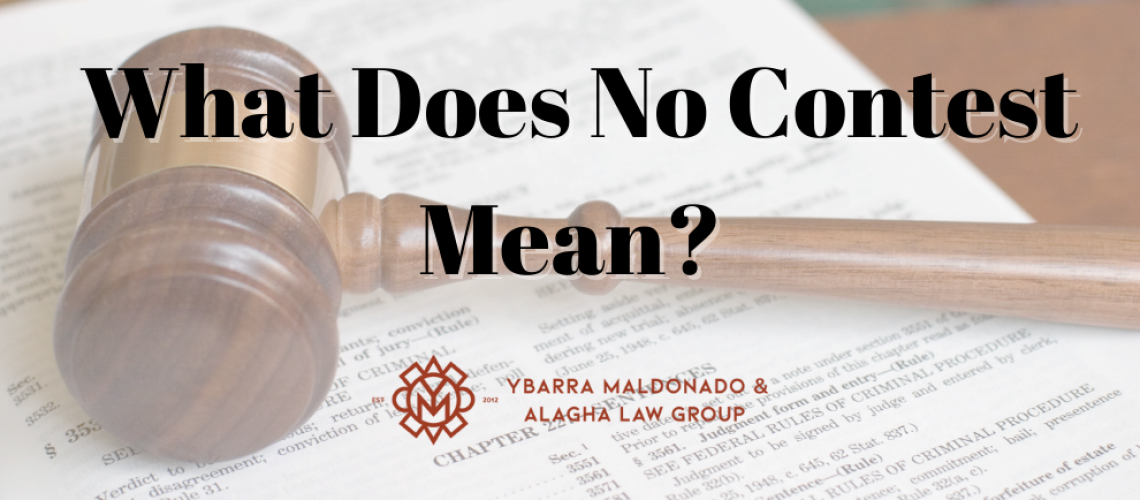The type of plea you enter at your arraignment is perhaps the most crucial step you take when you are charged with a crime. A person’s formal response to a criminal charge is called a plea. You have four options when entering a plea in a court of law: guilty, not guilty, not guilty by reason of insanity, and no contest. Most people are familiar with the terms “guilty” and “not guilty.” However, you and your lawyer may want to consider another less known option called “nolo contendere” or “no contest.”
The legal term “nolo contendere” stems from the Latin phrase “I do not wish to contend.” The meaning of both the Latin term and its English translation is the defendant neither denies nor admits to the charge leveled by the prosecution. In other words, you acknowledge the truth of the facts, even if you don’t admit your guilt.
A guilty plea and a no contest plea are sometimes used interchangeably. However, each can have different consequences for a criminal defendant pleading to a charge.
The Phoenix criminal defense attorneys at Ybarra Maldonado Law Group can assist you in determining what is best for your circumstance. As a defense firm, we have extensive experience defending clients and achieving the best possible results for them.
What Is a Plea?

Your on-the-record response to the criminal allegations leveled against you is known as a plea. In a criminal case, you are the defendant, and you have the choice of entering a plea of guilty, not guilty, not guilty by reason of insanity, or no contest. Your response will be formally noted or entered into your official hearing file by the court.
What Is a No Contest Plea?
When an accused pleads no contest, he or she accepts the conviction but does not admit guilt. A guilty plea is equivalent to a no contest plea. When defendants enter a plea of no contest, they are essentially acknowledging that they are guilty of the accusation. They will also face the same jail or prison sentence as if they had entered a guilty plea.
Court Discretion
In most cases involving the death penalty, no contest pleas are not permitted. In other circumstances, a judge chooses whether to accept a no contest plea or not. A judge will not accept a plea of no contest, for example, if the facts clearly reveal the defendant’s innocence.
A judge must also ensure that a defendant is pleading no contest knowingly and freely. This means that the defendant’s plea cannot be swayed by threats or promises. They must be fully aware of the allegations and the legal implications of a no contest plea. This includes giving up certain rights.
You Don’t Always Get the Choice of What To Plead For
It’s worth noting that defendants aren’t always given the option of pleading no contest rather than guilty. As part of a plea deal, prosecutors may require the defendant to plead guilty.
What Is a Guilty Plea?

When a defendant enters a guilty plea, he or she is admitting to the court that they committed the charged offense.
This plea must be heard in court so that it can be entered into the court record. The accused effectively swears on oath that he or she is aware of the crime alleged and that he or she is guilty of it.
A court will frequently ask a defendant if he or she understands what pleading guilty means. The defendant is asked if they know what the crime they are charged with means, that a guilty plea admits they committed the charged crime, consequences and possible sentences, and the defendant’s rights that are waived due to their plea.
With their guilty plea, a defendant waives their right to counsel, a jury trial, to not incriminate themself, and to face their accuser.
When the defendant agrees to this, the judge usually accepts the plea and determines that it is reasonable. From there, the case moves to the sentencing phase.
How Is a No Contest Plea Different From a Guilty Plea?
A no-contest plea is similar to a guilty plea in that it has the same basic effects as a guilty plea but without the official acknowledgment of guilt. To put it another way, if you plead guilty, you are admitting to the facts as well as the legal implications of those facts.
A no contest plea, on the other hand, has the advantage of not being used against you in a subsequent civil or criminal prosecution.
It’s crucial to note that before you can plead no contest in Arizona, the judge must accept the plea, check that you comprehend the court’s decision, and ensure that you are entering your plea voluntarily rather than being coerced or misled.
When you accept a plea bargain, you usually give up three fundamental rights found in the Fifth and Sixth Amendments. These rights include the right to a jury trial, the right to remain silent, and the right to question witnesses.
What Does Pleading No Contest Mean In a Misdemeanor Case?
If a defendant pleads no contest to a misdemeanor charge, their plea cannot be used against them as an admission of guilt in a civil lawsuit. If a criminal case victim sues the defendant, the victim must prove the defendant’s liability by a preponderance of the evidence. Pleas of not guilty cannot be considered as evidence.
What Does Pleading No Contest Mean In a Felony Case?
A no contest plea has the same impact as a guilty plea in most felony cases. It can be used as an admission of guilt in any other legal process, including civil lawsuits.
Why You Might Consider a No Contest Plea

When the defendant has some form of disability and can’t remember the details or event that led to their presence in court, no contest is acceptable.
Suppose you’ve reached a stage in your case where the evidence is too strong against you and you don’t have a possibility of winning. A no contest plea may be to your benefit. No contest is preferable to admitting guilt. This is because it cannot be used against you in future civil trials for the same act.
Often, defendants plead guilty to get a better deal or to be charged with a lesser offense and punishment.
Restrictions on Pleading No Contest
Pleading no contest has different rules in different states, and in some places, it isn’t allowed. The judge is unlikely to let you file a nolo contendere plea while claiming your innocence to the media.
That’s called an Alford plea. Based on a 1963 murder case in North Carolina where the defendant maintained his innocence. However, to avoid the death penalty, he pled guilty to second-degree murder.
Additionally, no contest pleas are typically not allowed in AZ homicide cases.
When Pleading Guilty Is Better Than No Contest

If the prosecution offers you a plea agreement, you may be compelled to enter a guilty plea in order to accept it. Only a Phoenix criminal defense attorney can help you assess the legal consequences of accepting a plea bargain and pleading guilty in front of a judge.
Be sure you know what you’re doing before entering your guilty plea. You can’t change it once you’ve entered it. A plea bargain frequently results in a lower sentence than the maximum allowed for your crime. However, this does not always mean it is the best deal you could receive. This is where your lawyer can really help you out and provide you with some advice legal advice.
Next is a sentencing hearing, where the defendant finds out what penalty they get for the offense for which they have been found guilty. If you’re confused about making a no contest plea, speak with a lawyer at Ybarra Maldonado Law Group.
Consult an Experienced Phoenix Criminal Defense Lawyer at Ybarra Maldonado Law Group
For guidance on the consequences of a no contest plea under Arizona law or to go over your case with one of our Phoenix criminal defense lawyers, contact the Ybarra Maldonado Law Group today. Protecting your rights with a thorough investigation of your case and creating a strong defense is our attorneys’ priority. Our experienced criminal defense team may help you avoid the repercussions of offenses. Our attorneys handle cases involving crimes such as AZ DUI, AZ drug possession, or AZ theft crimes.
We have extensive experience defending clients against a wide range of criminal offenses at Ybarra Maldonado Law Group. We use a client-centered approach to ensure that the legal process goes as smoothly as possible. Schedule a consultation with a criminal defense attorney concerning no contest or other pleas. Call (602) 910-4040 or filling out our online contact form today.


